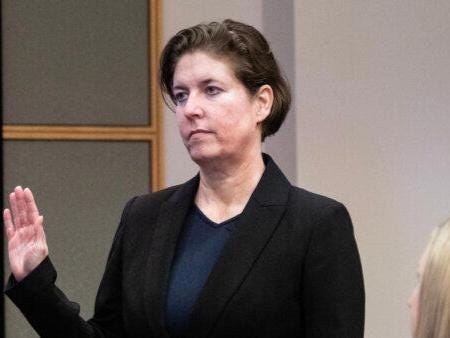Holiday Bonus: All I Want for Christmas Is to Detect Deception
This Holiday season give yourself the gift of learning some Statement Analysis; it’s not just for True Crime
By Jack Fox
You’re a True Crime fan and it’s the holiday season so my guess is you’re going to be spending a lot of time with family, friends and serial killers… well at least binging on some podcasts and documentaries about bad people.
To make things easier, I’m giving you the gift of four Statement Analysis tips so you can understand what you’re hearing from your holiday companions.
Statement Analysis is the process of inspecting the words someone says or writes to look for indicators of whether they are being honest, deceptive or hiding something. It’s great with questions like “did you kill your wife” or “who took the last cookie?”
If you do try this at home over the holidays, make sure you consider the context, culture, life experiences, personality, motivations and neurodiversity of all those involved. Regardless of the factors, these general tips are likely to be helpful in sussing out the Cookie Monster hiding in the shadows.

1. DO THEY ANSWER THE QUESTION?
Multi-murderer Chris Watts is being interviewed while pretending to be worried out of his mind about his missing wife, Shanann, and their kids.
The interviewer asks him “What is the police saying to you?”
Chris replies with “right now, this is what they’re doing right now, is with canines and scents. I think this is the biggest thing… this is the biggest thing they’ve done so far”.
That sets off my Statement Analysis alarm bells. The interviewer asked what are the police SAYING and Chris’s answer deals with what the police are DOING.
That suggests to me he doesn’t want to share what the police are indeed saying to him. Maybe they’re asking him tough questions, maybe they’re saying nothing. As neither option suits Chris’s concerned-family-man narrative, he doesn’t directly answer the question. In fact, he’s probably saying what he is actually worried about: what the police are doing behind his back.
So if you ask one of your children “what did you say to upset your sister?” and they answer with “we were wrapping gifts and then she stormed off” or “she told me I was the worst brother ever”, you can be pretty sure that child doesn’t want to share what it was they said.

2. JUMPS IN TIME
This year Sarah Boone started a life sentence for killing her boyfriend, Jorge Torres.
At her trial, Sarah was asked “Tell the jury what happened”. Her response was “we continued to speak to one another and his tone changed and we ended up, I guess, arguing”
“Ended up” signals a jump in time. They were talking, something happened and that something caused the arguing to start. Whatever it was can’t reflect well on Sarah, and she’s hidden that something by skipping over it with the words “ended up.”
So, when you ask your partner why they came home late from the party and they say “I was going to leave early, but I ended up enjoying myself” or “Susan got really drunk, so I ended up having to take her home”, dig into what happened before that “ended up” or between that “and, then.” What is it they are concealing?

3. NOT SAYING YES OR NO
Steven Avery is giving an interview to a reporter about missing woman Teresa Halbach who disappeared after doing a job for Avery. At the time, he was feigning innocence. Today he’s serving life for her murder.
INTERVIEWER: If they asked to take a polygraph, would you, would you not?
AVERY : I got nothing to hide, if they want me to, I don’t care.
It’s a yes or no question - Avery can say “yes” or he can say “no”. He doesn’t say either. He can’t bring himself to say “yes,” probably because that would be psychologically scary for him and he likely can’t say “no” as that’s just not a good look. Conclusion; the polygraph worries him.
So when you ask your best friend or your partner “do you like the gift I got you” and you get a reply like “I’ve been thinking about getting something like that for years” or “where did you buy it” and don’t say “yes,” very quickly, question your choice – and, perhaps, whether your friend or partner is comfortable telling you though truth .

4. GOING EXTRA
What do you notice about Scott Peterson’s answer here? Scott, who was later convicted of the murder of his wife, Laci, spoke to the police just hours after she was reported missing.
DETECTIVE: When did you realize you were gonna go fishing?
PETERSON: Well, that was a morning decision, it's either go play golf at the club, or go fishing. It seemed too cold to go play golf at the club (chuckle) so um, yeh, just decided that you know, might as well do that. She told me what she was gonna do for the day and …
In Statement Analysis terms, he “goes extra.” He answers the question of ‘when’ very quickly with ‘a morning decision.” Peterson then talks about his options and decision-making process and makes sure to mention Laci spoke to him that morning.
Going extra is often revealing. The “extra” indicates what the person you’re hearing from wants to talk about. They’re so keen for you to know this information that they’ll tell you about it even when you haven’t asked about it.
In Scott’s case, that’s probably because it was important to him to show the detective why he’d chosen boating rather than golf and that he’d had a conversation with Laci that morning; that is, he wanted to give the impression she was still alive.
So, when you ask your colleague “When did you decide to go to the gym on Christmas Day?” and they reply “it was a morning decision, I was going to go for a hike, but it was too cold (chuckle)”… run a mile!!
Jack Fox is the host of the YouTube channel and podcast Never a Truer Word and is an expert in Statement Analysis.
Editor’s Note: As a Holiday bonus, we thought we would give you a fun treat of an article on the lighter side. For more information on assessing credibility and deception detection, check out these interviews with CIA Officer Kent Clizbe and Jack Fox here and here. For examples of statement analysis, check out this episode of The Prosecutors Podcast on the JonBenet Ramsey case ransom note and this one from the retired FBI Profilers on The Consult podcast.




